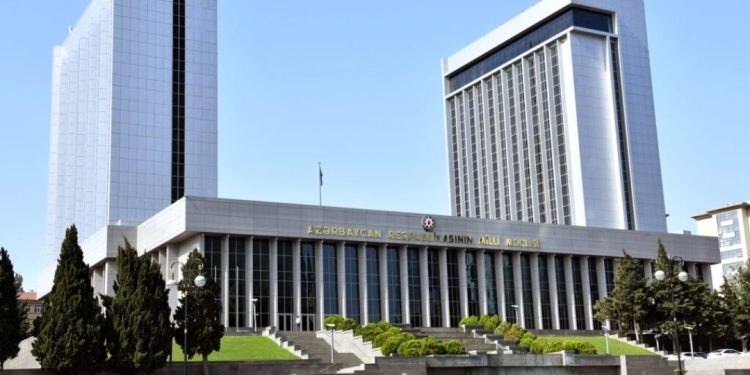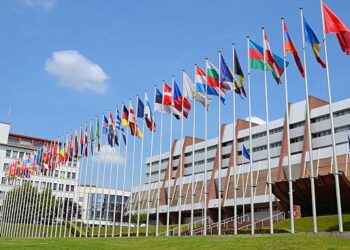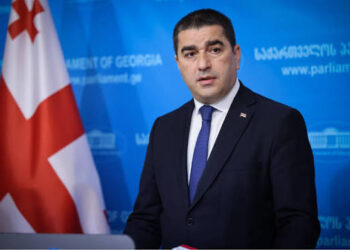Azerbaijan’s ruling party and independent candidates believed to be linked to the government have secured a majority in Sunday’s snap parliamentary elections amidst reports of electoral violations.
The snap elections on Sunday ended with the ruling New Azerbaijan Party securing a majority in parliament with 67 seats, according to Turan.
Turan has reported that 45 seats went to independent candidates, which many believe are linked to the government.
The Civic Solidarity Party secured three seats, while Justice, Law, Democracy won two seats. Both parties are believed to have ties to the government.
All other parties that managed to secure representation in parliament won one seat each: Republican Alternative, National Independence, Democratic Reforms, Fatherland, Great Establishment, Great Azerbaijan, National Front, and Democratic Enlightenment.
Central Election Commission head Mazahir Panahov reported that voter turnout was just 37.27%, the lowest ever for parliamentary elections in the country’s independent history.
The final results of the snap parliamentary elections will be announced by September 22.
Musavat party: “Elections took place in an undemocratic environment”
The opposition Musavat Party, which fielded 25 candidates in the elections, did not secure any seats in the parliament. The party’s central election headquarters stated that the elections were conducted without a democratic environment conducive to free and fair political competition, with unequal opportunities for all political forces, restrictions on freedom of speech, media, expression, and assembly, as well as pressure and repression against journalists, political activists, and government critics on social media.
“Voter turnout was extremely low. At some polling stations, there were no voters for hours.
“The voting was marked by widespread violations, including multiple votes by the same individuals and groups, ballot stuffing, and pressure on observers.
“These violations were documented, and videos have been circulated online.”
:The continuity of the electoral process was disrupted at most polling stations where Musavat candidates were present, and vote counting was not conducted immediately after the end of voting.
“Preliminary results were announced based on top-down data.
“Given these issues, Musavat declares that the September 1 snap elections for the Milli Majlis were neither free nor fair,” the party stated.
The document also says that the elections did not meet international standards or Azerbaijan’s obligations to international organizations it participates in:
“The party does not consider the Milli Majlis, formed based on these non-free, non-fair, and undemocratic elections that do not reflect the will of the people, to be a legitimate legislative body.
Musavat demands the annulment of the elections, the implementation of reforms, including electoral reforms, to build a rule-of-law state and democratic society, and the holding of new parliamentary elections.”
Natig Jafarli: “Even administrative resources couldn’t boost turnout above 37%”
Another opposition party, the Republican Alternative (ReAl), secured one seat in parliament. The sole representative from the party is board member Erkin Gadirli, who was re-elected for a second term.
In the 2020 parliamentary elections, ReAl ran with 29 candidates. This time, the party had 12 candidates.
One of ReAl’s leaders and a candidate for parliament, Natig Jafarli, believes that “every successive election in Azerbaijan is worse than the previous one.”
We again witnessed an electoral process with numerous violations. But I want to offer a slightly different perspective. These elections have once again shown that the Azerbaijani government’s administrative resources are insufficient for achieving a clear and confident victory.
Voter turnout was only 37 percent. They couldn’t even reach 40 percent. This should be a wake-up call for the Azerbaijani authorities. They need to understand that despite all their resources, including ballot stuffing and ‘carousel voting,’ achieving only a 37-percent turnout is a tragedy for the country’s future,” he said.
Jafarli believes that deepening mistrust in the electoral system creates conditions for the emergence of “non-electoral processes” in the future.
“After a while, controlling these processes through force will no longer be possible. This election also demonstrated that there is significant public discontent related to social, economic, and corruption issues. Elections are the civil expression of this discontent. Each time elections are held at such a disgraceful level, public trust in the electoral system is eroded. This poses a threat to the future of the Azerbaijani state.”
PFPA: “Elections held under conditions of restricted rights and freedoms”
One of the main opposition parties in the country, the Azerbaijan Popular Front Party (PFPA), boycotted the elections, citing the government’s refusal to ensure fair and equal conditions for all candidates.
The party has not participated in any elections since 2015.
Following the elections, the party declared that it does not recognize the legitimacy of the election results, stating that “these ‘elections’ were held under conditions where basic rights and freedoms were denied to citizens, real opposition and the people boycotted them, and there was no competition.”
“We proposed creating the most basic conditions, such as freeing over 300 political prisoners in the country, respecting freedom of assembly, allowing opposition representation in election commissions, and providing opportunities for independent organizations and opposition to observe the elections. However, these proposals were ignored,” the party’s statement read.














